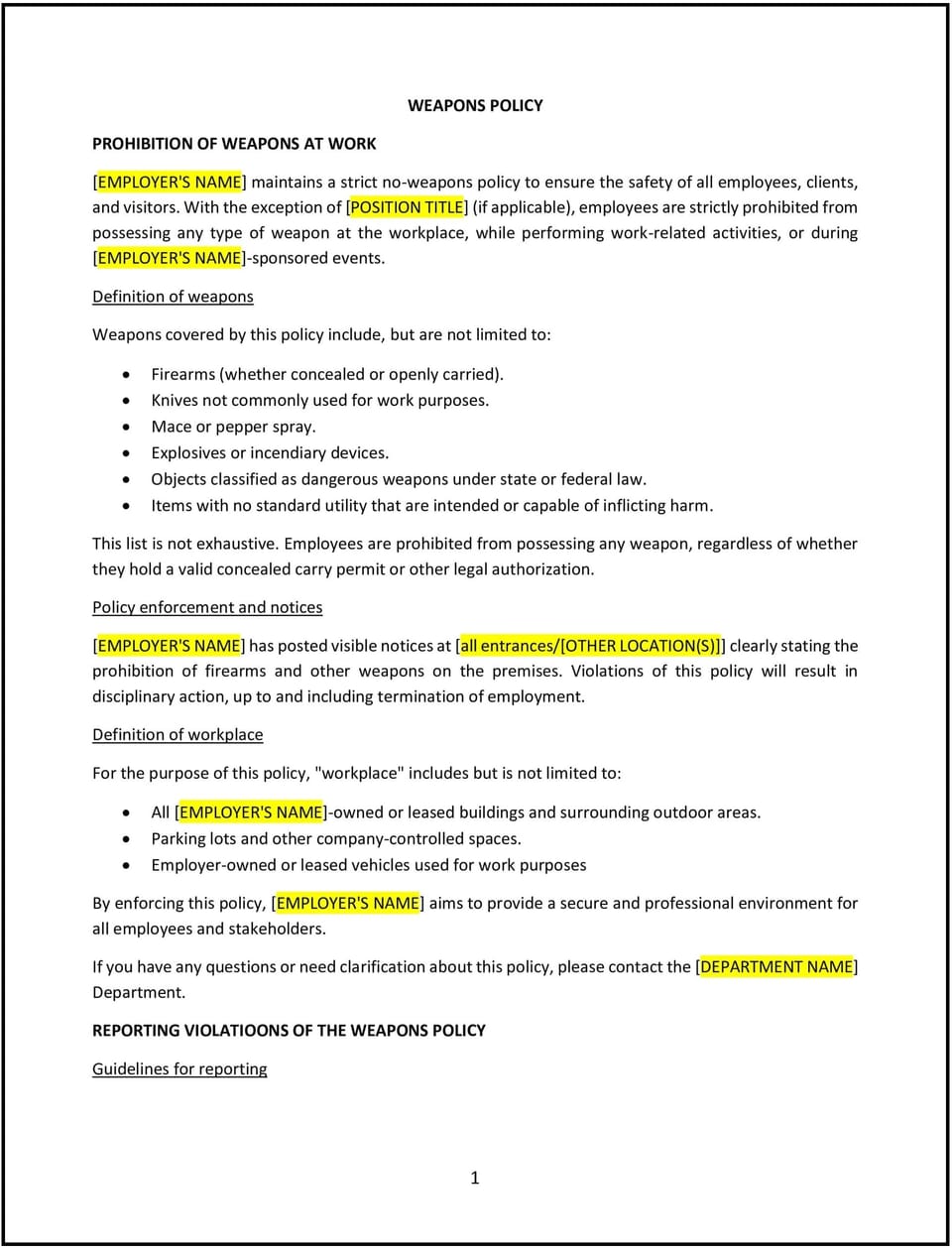Weapons policy (Arkansas): Free template

Weapons policy (Arkansas)
In Arkansas, a weapons policy provides businesses with guidelines to ensure a safe and secure workplace by addressing the presence, possession, and use of weapons on business premises. This policy establishes clear rules about prohibited items and outlines procedures for reporting and handling violations.
This policy helps Arkansas businesses comply with state and federal regulations, mitigate risks, and protect employees, customers, and visitors from potential harm. By implementing this policy, businesses can foster a culture of safety and trust.
How to use this weapons policy (Arkansas)
- Define prohibited items: Clearly list the weapons that are not allowed on business premises, such as firearms, knives, or explosives, unless otherwise permitted by Arkansas law.
- Address exceptions: Specify any circumstances where weapons may be permitted, such as law enforcement officers or licensed concealed carry under Arkansas statutes.
- Establish reporting procedures: Provide clear steps for employees to report concerns or suspected violations of the policy.
- Communicate consequences: Outline the disciplinary actions for violations, which may include warnings, suspension, or termination.
- Promote awareness: Educate employees about the policy, emphasizing the importance of maintaining a safe workplace.
Benefits of using this weapons policy (Arkansas)
This policy offers several advantages for Arkansas businesses:
- Promotes safety: Reduces the risk of workplace violence or accidents involving weapons.
- Supports compliance: Aligns with Arkansas laws and federal regulations regarding weapons in the workplace.
- Enhances employee trust: Demonstrates the business’s commitment to providing a secure work environment.
- Provides clarity: Establishes clear rules and procedures, reducing misunderstandings or conflicts related to weapons.
- Protects the business: Minimizes legal and reputational risks associated with workplace incidents involving weapons.
Tips for using this weapons policy (Arkansas)
- Address Arkansas-specific considerations: Ensure the policy reflects state laws regarding weapons, such as concealed carry permits and workplace restrictions.
- Use clear signage: Post notices about the policy at workplace entrances to ensure compliance and inform visitors.
- Train employees: Provide guidance on recognizing and reporting potential violations of the policy.
- Maintain confidentiality: Protect the identity of individuals reporting suspected violations to encourage reporting and prevent retaliation.
- Review regularly: Update the policy to reflect changes in laws, workplace dynamics, or security needs.
Q: How does this policy benefit the business?
A: This policy helps maintain a safe work environment, supports compliance with Arkansas weapons laws, and reduces risks of workplace incidents involving weapons.
Q: What weapons are prohibited under this policy?
A: Prohibited weapons may include firearms, knives, explosives, and other dangerous items, as specified in the policy and aligned with Arkansas laws.
Q: How does this policy support compliance with Arkansas regulations?
A: The policy incorporates state laws regarding weapons in the workplace, ensuring the business adheres to legal requirements and promotes safety.
Q: What steps should employees take if they suspect a violation of this policy?
A: Employees should report concerns to their manager or designated contact following the procedures outlined in the policy, ensuring confidentiality and prompt action.
Q: How can the business enforce this policy effectively?
A: The business can use clear communication, signage, employee training, and consistent application of disciplinary actions to enforce the policy and maintain safety.
This article contains general legal information and does not contain legal advice. Cobrief is not a law firm or a substitute for an attorney or law firm. The law is complex and changes often. For legal advice, please ask a lawyer.


